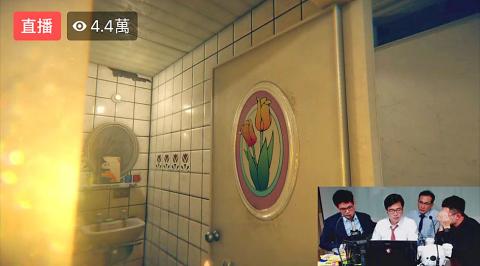A Taiwan-developed horror computer game being boycotted by Chinese netizens over an image mocking Chinese President Xi Jinping (習近平) was removed from global digital distribution platform Steam on Tuesday, just seven days after its release.
The game’s Taiwanese developer, Red Candle Games, said on Facebook that it pulled Devotion (還願) from Steam because of technical problems and alluded to the boycott caused by the artwork that angered Chinese users.
“Due to technical issues that cause unexpected crashes and among other reasons, we are pulling Devotion off from steam store to have another complete QA [quality assurance] check,” the company said in an English-language statement.

Photo: Lo Tzu-hsin, Taipei Times
“At the same time we’d like to take this opportunity to ease the heightened pressure in our community resulted from our previous Art Material Incident,” Red Candle Games said. “Our team would also review our game material once again making sure no other unintended materials was inserted in.”
“Hopefully this would help all audience to focus on the game itself again upon its return,” it said.
The horror puzzle game was released on Tuesday last week, but soon faced a boycott by Chinese users, creating a controversy that has been played up in local media.
Vice Premier Chen Chi-mai (陳其邁) defended the game and criticized China’s censorship and control over the media.
“Only in countries with democracy and freedom can creation be free from restrictions,” Chen said.
A screenshot on a Chinese microblogging site of a charm amulet hanging on the wall of a room in the game angered Chinese netizens after it was noticed that the names of Xi and Winnie-the-Pooh were written on the amulet in red.
The reference was unrelated to any aspect of the game.
Winnie-the-Pooh has been used to mock Xi since a picture of the Chinese leader walking with then-US president Barack Obama in 2013 spurred comparisons to Winnie-the-Pooh walking with Tigger.

Japanese footwear brand Onitsuka Tiger today issued a public apology and said it has suspended an employee amid allegations that the staff member discriminated against a Vietnamese customer at its Taipei 101 store. Posting on the social media platform Threads yesterday, a user said that an employee at the store said that “those shoes are very expensive” when her friend, who is a migrant worker from Vietnam, asked for assistance. The employee then ignored her until she asked again, to which she replied: "We don't have a size 37." The post had amassed nearly 26,000 likes and 916 comments as of this

US President Donald Trump said "it’s up to" Chinese President Xi Jinping (習近平) what China does on Taiwan, but that he would be "very unhappy" with a change in the "status quo," the New York Times said in an interview published yesterday. Xi "considers it to be a part of China, and that’s up to him what he’s going to be doing," Trump told the newspaper on Wednesday. "But I’ve expressed to him that I would be very unhappy if he did that, and I don’t think he’ll do that," he added. "I hope he doesn’t do that." Trump made the comments in

Tourism in Kenting fell to a historic low for the second consecutive year last year, impacting hotels and other local businesses that rely on a steady stream of domestic tourists, the latest data showed. A total of 2.139 million tourists visited Kenting last year, down slightly from 2.14 million in 2024, the data showed. The number of tourists who visited the national park on the Hengchun Peninsula peaked in 2015 at 8.37 million people. That number has been below 2.2 million for two years, although there was a spike in October last year due to multiple long weekends. The occupancy rate for hotels

A cold surge advisory was today issued for 18 cities and counties across Taiwan, with temperatures of below 10°C forecast during the day and into tonight, the Central Weather Administration (CWA) said. New Taipei City, Taipei, Taoyuan and Hsinchu, Miaoli and Yilan counties are expected to experience sustained temperatures of 10°C or lower, the CWA said. Temperatures are likely to temporarily drop below 10°C in most other areas, except Taitung, Pingtung, Penghu and Lienchiang (Matsu) counties, CWA data showed. The cold weather is being caused by a strong continental cold air mass, combined with radiative cooling, a process in which heat escapes from